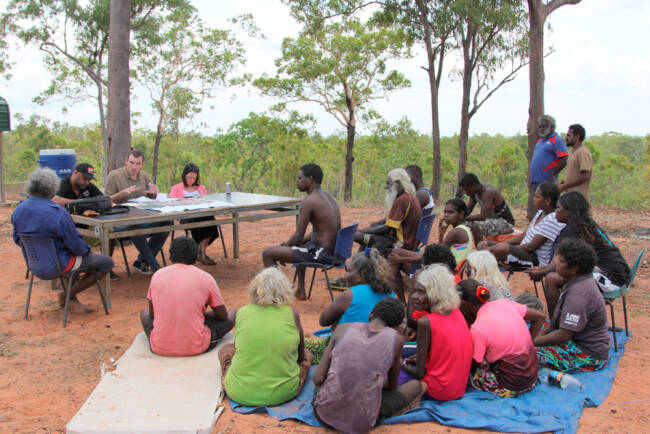Our land and people
The NLC constituency has about 51,000 Aboriginal residents, 75 per cent of them living in regional and remote areas in about 200 communities ranging in size from small family outstations to communities with populations of about 3000.
Yek Maninh Traditional Owners discuss lease and royalty issues with NLC representatives
The majority of these people speak an Aboriginal language as their first language. Many are multi-lingual, and English is often a secondary language. Customary law constitutes the primary rules by which people continue to conduct their lives.
Traditional land and sea ownership is based on customary law, passed from generation to generation. This sacred trust involves defined groups or people, their ancestors and descendants.
In many areas, a system of 'managers' and 'owners' operates. Land managers generally have maternal links to land while landowners generally have paternal links to land. Aboriginal landowners and managers have specific and complementary rights and obligations to ensure the spiritual and physical health of defined areas of land.
Aboriginal land is private property owned under special freehold title. It is inalienable – in other words, it cannot be bought, acquired or forfeited.
The Aboriginal Land Rights (NT) Act 1976 has enabled Aboriginal people to gain inalienable freehold title to 50 per cent of the Northern Territory and, through the High Court's 2008 Blue Mud Bay decision, about 85 per cent of the NT coastline.
For the most part, Aboriginal landowners with inalienable Aboriginal freehold have the exclusive power to control the direction and pace of development on their lands. The public, in the form of Government at various levels, has only limited rights to impose external development or conservation direction or constraints.
Aboriginal land is not owned by individuals. It is granted as a communal title. Land is formally held by land trusts - groups of Aboriginal people who hold the title for the benefit of all the traditional owners and people with a traditional interest in the land.
Under the Land Rights Act, decisions over the use of Aboriginal land must have the consent of the traditional owners as a group and ratified by the Land Council. Aboriginal land in the Northern Land Council area is held as inalienable Aboriginal freehold – the strongest form of title in Australia.
The nature of Aboriginal inalienable tenure differs from mainstream definition of private land inasmuch as such land cannot be bought or sold. It can however be leased from the Aboriginal Land Trusts (which hold title) to Aboriginal corporations or to non-Aboriginal interests with the informed consent of traditional owners.


